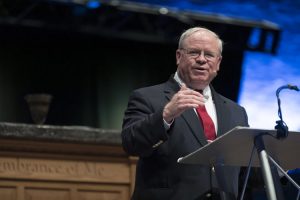 By Keith Boyette –
By Keith Boyette –
This year, The United Methodist Church is 52 years old. Of course, the Methodist movement, currently composed of approximately 80 distinct Methodist denominations worldwide, is much older than that. The UM Church was formed from the union of The Methodist Church and the Evangelical United Brethren Church in 1968. Methodism, as with all parts of the Christian family, has experienced its share of divisions and reunions over its more than 225-year existence as a global movement.
For 48 of its 52 years, the UM Church has known ever-increasing levels of conflict regarding the authority and interpretation of the Bible, and the church’s doctrines and ethics. The presenting debate has focused on our sexual ethics, our definition of marriage, and our ordination standards. That debate has become more heated and polarizing with each passing year.
The thought of amicable separation was first discussed at a General Conference, the quadrennial legislative gathering for the UM Church, in 2004 in Pittsburgh, Pennsylvania. At the 2012 and 2016 General Conferences, leaders of various constituencies in the church met to discuss whether it was time to separate. Each time, we opted for legislative conflict over dealing directly with our irreconcilable differences. In 2016, a diverse group of leaders asked the Council of Bishops to lead the UM Church toward separation. Instead, the Council of Bishops recommended the creation of a Commission on the Way Forward with a charge to find a way to maintain institutional unity despite deep and growing conflict. The General Conference ultimately authorized the Council of Bishops to create their proposed commission.
Read the rest of the article here.






Can the traditional denomination revert back to pre-1968 and reclaim THE METHODIST CHURCH name for the separation denomination?
The more I think about this, the less I like it. This agreement seems like unconditional surrender, after winning vote after vote on this issue. The moral issue is what matters here too, separating and letting the wrong side in this argument ‘win’ and become the United Methodist Church, a familiar brand to many, is just wrong.
What does this say to those who believe LBGTQ… practice is wrong, especially those who are young and live in other parts of the world? Instead of fighting the people who are wrong so they leave, if we leave are we not making a statement that our beliefs are not worth fighting over, or we are a minority view.
In other words, this is a hill that traditionalists should not surrender. We should not leave, we should fight and dispute until those who disagree leave. Hey, the migration of the progressive wing of the church has already begun, let them go.
Not In Favor, I understand your concern and have wrestled with the same emotions. But please realize what you are saying. We cannot “win” this war without being able to bring the Bishops under control. That will take a change in the constitution and a 2/3rds majority. Assuming the traditionalist hold on in the US and Africa continues to grow and stay traditional you may well be looking at a 20 year battle to take over the UMC and return it to Biblical beliefs. All of our energy will be consumed by the fight while a church run by liberal bishops (that’s all that will be elected at this years jurisdictional conferences) and pulpits with only liberal pastors, will force most of the traditional laity out. Do you really want to go through that? In the meantime we will not be making disciples of Christ with true biblical beliefs. How many souls are we willing to sacrifice so that we may win the war. It is better to lose the war and get on with the job at hand, which is serving Christ, not preserving a human institution.
Someone assure me that there will be strong assurances of accountability and binding constraints at all levels of ecclesiastical polity in the new denomination. Not to start a church government row, but frankly the term “bishop” in the New Testament and early Church was nowhere near what it became in the UMC. Early bishops were pastors. Bishops/pastors in larger Mediterranean cities accrued more influence, of course, and mentored bishops in smaller cities/churches, but never was there the ridiculous level of autonomy resulting from the 1968 merger. History will look back at the actions of the UMC council of bishops for at least the last half of the union’s life with a combination of distaste, disdain, disgust, confusion, and frankly incredulity.
Frankly, the new denomination should have no office even resembling the failed version of bishop in the UMC. Call it something else or go back to the Bible and 1st/2nd century history.
Are the traditionalists in the U.S. going to become part of the new Methodist denomination with traditionalist globally?